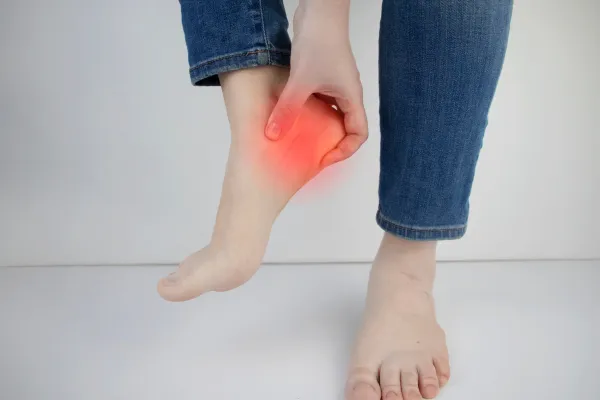Tips & Advice From Foot & Ankle Associates of Southern NH

The Connection Between Heel Pain and Other Conditions: Rheumatoid Arthritis, Diabetes, and Obesity
Heel pain is a common issue that affects many individuals, and while it can often be caused by injuries, overuse, or poor footwear, it’s also closely linked to certain underlying health conditions. At Foot and Ankle Associates of Southern NH, we understand that heel pain can sometimes be a symptom of more complex health issues such as rheumatoid arthritis, diabetes, and obesity. In this blog, we will explore how these conditions contribute to heel pain and what you can do to manage it.
1. Rheumatoid Arthritis and Heel Pain
Rheumatoid arthritis (RA) is an autoimmune condition that causes inflammation in the joints, often affecting the feet and ankles. People with RA often experience pain, swelling, and stiffness in the joints, which can extend to the heels. The inflammation can affect the ligaments and tendons in the foot, leading to discomfort and pain in the heel area. As the disease progresses, it can lead to structural changes in the foot, including deformities that put additional strain on the heel.
Managing Heel Pain from RA:
Early diagnosis and treatment are key to managing heel pain related to rheumatoid arthritis.
Medication to reduce inflammation and pain, such as NSAIDs (nonsteroidal anti-inflammatory drugs), can help.
Custom orthotics may be recommended to support the foot and reduce pressure on the heel.
Regular low-impact exercise, such as swimming or cycling, can help improve joint mobility without aggravating the condition.
2. Diabetes and Heel Pain
Diabetes, especially when it is not well-controlled, can lead to a condition called diabetic neuropathy, which affects the nerves, causing numbness, tingling, or even pain in the feet. In addition to nerve issues, people with diabetes are also at an increased risk of developing poor circulation in their feet, which can lead to a variety of foot problems, including heel pain.
Furthermore, high blood sugar levels can lead to the thickening of tendons and ligaments, affecting the structure and function of the feet. This can result in conditions like plantar fasciitis, where the tissue that supports the arch of the foot becomes inflamed and causes sharp heel pain.
Managing Heel Pain from Diabetes:
Maintaining proper blood sugar levels is essential to reduce the risk of diabetic foot complications.
Routine foot care, including daily inspections for cuts, blisters, or signs of infection, is crucial.
Special diabetic footwear or custom orthotics may help alleviate heel pain and prevent further damage.
If you experience nerve pain or numbness, consult with your doctor or podiatrist for management strategies.
3. Obesity and Heel Pain
Obesity is another major contributor to heel pain, particularly plantar fasciitis. Excess body weight puts additional stress on the feet, especially the heel area, which is responsible for supporting the majority of your body weight while standing, walking, or running. This added pressure can cause inflammation in the plantar fascia, leading to painful heel spurs and chronic discomfort.
Moreover, obesity can affect the overall structure and biomechanics of the feet, leading to increased wear and tear on the joints and ligaments. This can make you more susceptible to injuries and conditions like Achilles tendonitis or stress fractures in the heel.
Managing Heel Pain from Obesity:
Achieving a healthy weight through diet and exercise is one of the most effective ways to reduce heel pain related to obesity.
Low-impact activities like swimming, cycling, or using an elliptical machine can help with weight loss without putting additional strain on your feet.
Using supportive shoes and custom orthotics to cushion the heel can provide relief and prevent further damage.
Consulting with a podiatrist or a healthcare provider to develop a tailored plan for weight management and foot health can also be beneficial.
Conclusion
Heel pain should never be ignored, especially if you suffer from rheumatoid arthritis, diabetes, or obesity. These conditions not only contribute to foot discomfort but can also lead to long-term complications if left untreated. At Foot and Ankle Associates of Southern NH, we are dedicated to identifying the root cause of your heel pain and providing the most effective treatments to help you manage and alleviate discomfort. Whether through custom orthotics, lifestyle changes, or medical treatments, we are here to help you live pain-free.
If you’re experiencing persistent heel pain or suspect it may be related to one of these underlying conditions, schedule a consultation with us today. Let’s work together to get you back on your feet!
Ask Foot & Ankle Associates of Southern NH And Their Team
Fill in the form to request a call from our team. One of our team members will call you for FREE and answer any questions or concerns you may have about your condition
Where To Find Foot & Ankle Associates of Southern NH

If you have any questions before scheduling an appointment or for general inquiries, please use the contact us button below. Our team will promptly reach out to assist you.
Opening Hours
Monday: 8:00am – 5:00pm
Tuesday: 8:00am – 5:00pm
Wednesday: 8:00am – 2:00pm
Thursday: 8:00am – 5:00pm
Friday: 8:00am – 2:00pm
Saturday: Closed
Sunday: Closed

